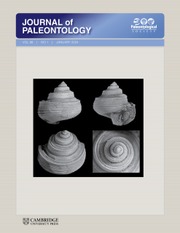It is great pleasure for me to introduce to you the 2019 Paleontological Society Medalist, David John Bottjer. Dave and I have been close friends for many years, a friendship that in part stems from the proximity of the University of Southern California (USC), where Dave has been on the faculty since 1979, and UCLA, where I have been a faculty member for a decade longer. Moreover, we both cut our paleontological eyeteeth in Paleozoic strata of the mid-west—for Dave, as a graduate student at Indiana University and for me, during my youth in central Ohio. And we share similar backgrounds, both being offspring of well-educated families and both spending our undergraduate years at small co-educational liberal arts colleges—for Dave, at Haverford and Bryn Mawr, northwest of Philadelphia, and for me at Oberlin, southwest of Cleveland. Graduates of these institutions are forever saddled with the same telling fate, namely “that though they may not do well [financially], they are committed to doing good [for the society].” In short, Dave and I are linked not only by our similar backgrounds but, above all else, our shared values.
How does Dave put these values in action? Have a look at his record. Since his arrival at USC in 1979, he has mentored an impressively large contingent of 30 Ph.D. students, a great many of whom have gone on to become leading paleontologists in the United States and, more recently, in China and the United Kingdom. From 2004–2006 he served as President of our Society, but his contributions to us all have been far more as Dave served on more than a dozen Paleo society action-committees and has organized no fewer than 14 Society-sponsored symposia at our annual meetings. And his commitment to our science has crossed society boundaries as he also served on some 14 committees for SEPM, six national NSF and NATO paleontological committees, and has served paleontology internationally both in North America, though his service to North American Paleontological Conventions, and in China where he has helped oversee four international Geobiology meetings.
Dave Bottjer's contribution to the publication of paleontological science is similarly legendary. As an Editor of no fewer than six major journals with significant paleontological content, a well-known book series, and eight special issues of scientific journals he has played a pivotal role in helping our work to be published! To my knowledge, there is no one else in the history of our science who has amassed such an outstanding record of national and international contributions to our field.
Without doubt, Dave Bottjer has helped us all. But what are his major discoveries? How has his science furthered paleontological knowledge? Here, again, look at the record. An outstanding, world-class paleobiologist-paleoecologist, Dave Bottjer has worked broadly on organism-sediment interactions and the ecological history of life. He has been at the forefront of a remarkable array of studies spanning the time-range from the Ediacaran through the Cenozoic, perhaps most notably: analyses of the onshore-offshore evolutionary trends shown by many major invertebrate groups; the significance of low oxygen levels in determining the distribution of marine biofacies; the influence of microbial substrates on the metazoan fossil record; and detailed studies of mass extinction and recovery, particularly during the end-Permian and end-Triassic. Indeed, after 25 years of work, Dave is famous worldwide as now “owning” the Early Triassic!
An early classic was his analysis of tiering in suspension feeders on Phanerozoic soft substrates, a pivotal demonstration of how quantitative paleoecological data can reveal major evolutionary trends. Together with Mary Droser, he developed a consistent model for trace fossil analysis underpinned by the semi-quantitative ichnofabric index scheme that is now used universally. More recently, he has been a pioneer in the application of modern genomics to classical paleontological problems. And his latest classic—my favorite—is a brilliant contribution documenting the oldest fossil sponges now known, from the Ediacaran of South China.
Yes, Dave Bottjer has had a remarkable career! But it should be recognized that his success has been spurred not only by his exceptional students but, even more importantly, by his supportive wife, USC Professor of Biological Sciences and Psychology Sarah Bottjer. When their schedules permit, he and Sarah escape to their condo at Mammoth Mountain where they ski cross-country—and try to avoid shoveling the mammoth mounds of accumulated snow. And from time to time they even head off as globe trotting “birders” when Sarah is the photographer and Dave, the avid assistant. (If you want to have some fun, ask them about searching for condors in the Peruvian Andes, or their encounter with cassowaries in Australia's Daintree Rainforest!).
David J. Bottjer is an acknowledged leader of our field, both nationally and internationally, a Paleontological Society Centennial Fellow, and a recipient both of the SEPM Raymond C. Moore Medal for Excellence in Paleontology and the Albert S. Raubenheimer Award, the highest accolade presented by the USC Dornsife College of Letters, Arts and Sciences.
For a final snapshot of Dave's influence on his students and our science generally, one need look no farther than the full-day technical session “Studies in Paleobiology and Paleoecology: In Honor of Professor David J. Bottjer” convened at our 2017 annual meeting that featured 26 scientific talks by colleagues and former students. The entire session was a marvelous tribute to Dave that speaks volumes about his mentorship, his contributions to our science, and the appreciation and loyalty of his scientific offspring.
Obviously, Dave Bottjer is a creative, imaginative much appreciated leader, a “doer,” an accomplished problem-solver. But it is important to realize that these attributes, like Dave's other many successes are all rooted in but a single fundamental underlying cause—his exemplary values, his openness, his honesty, his long-time commitment to our science, and his pure human decency.
I am honored to present to you the 2019 Paleontological Society Medalist, David J. Bottjer.
September 22, 2019



